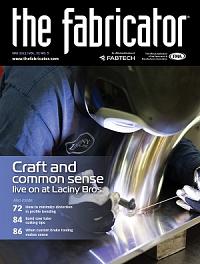Senior Editor
- FMA
- The Fabricator
- FABTECH
- Canadian Metalworking
Categories
- Additive Manufacturing
- Aluminum Welding
- Arc Welding
- Assembly and Joining
- Automation and Robotics
- Bending and Forming
- Consumables
- Cutting and Weld Prep
- Electric Vehicles
- En Español
- Finishing
- Hydroforming
- Laser Cutting
- Laser Welding
- Machining
- Manufacturing Software
- Materials Handling
- Metals/Materials
- Oxyfuel Cutting
- Plasma Cutting
- Power Tools
- Punching and Other Holemaking
- Roll Forming
- Safety
- Sawing
- Shearing
- Shop Management
- Testing and Measuring
- Tube and Pipe Fabrication
- Tube and Pipe Production
- Waterjet Cutting
Industry Directory
Webcasts
Podcasts
FAB 40
Advertise
Subscribe
Account Login
Search
Potential career paths are manufacturing’s greatest lure
Employers have positions to fill, but talented job seekers want rewarding careers
- By Tim Heston
- May 11, 2021
- Article
- Shop Management

Entry-level wages are on the rise. Fabricators have positions to fill, now. But protentional workers want careers—and in that arena, manufacturing has so much to offer. Getty Images
After graduating college in 2009, Patrick O’Rahilly dove head-first into the world of factory automation. He launched Compass Automation, an Elgin, Ill.-based custom automation builder that focused on robotics integration, complex assembly, and inspection.
In 2016 O’Rahilly pivoted and launched FactoryFix, a jobs- and career-oriented website that matches vetted job candidates with manufacturers in need of specific talent; that is, not just a machine operator, but an operator who has experience with a certain machine brand performing a specific process. As anyone who has hired in metal fabrication (or any machine-based skilled trade, for that matter) knows, programming a machine, setting up a machine, and operating a machine can require three entirely different skill sets. FactoryFix.com aims to match workers with specific skills with fabricators and other manufacturing companies that need those skills.
The pivot was a big one in many respects, but in other respects it was less of a pivot and more of an evolution—one that points to a broader issue. Manufacturing technology has changed, as have manufacturing careers. Industry continually trumpets new technology, but it really doesn’t trumpet the manufacturing career path. Yes, the industry needs skilled press brake operators, but what will life as a press brake operator look like?
Simple awareness of manufacturing is a challenge, and details behind a career in manufacturing often remain shrouded in mystery. That opaqueness, O’Rahilly said, might be one root cause behind the industry’s perennial skilled labor shortage.
“The industry as a whole doesn’t do a great job showing people how they can progress over an entire career and how exactly manufacturing can be a lucrative career path,” O’Rahilly said.
Running Compass Automation, O’Rahilly witnessed a manufacturing landscape undergoing transformation. “Companies were having trouble finding people to hire,” he said, “so our pitch at Compass was, ‘Let us build a machine to automate the process, so you don’t have to worry about it.’”
This seemed like a straightforward, honest pitch at first, but O’Rahilly soon discovered it oversimplified a complex situation. Yes, manufacturers had to automate to compete, but automation wasn’t a cure-all for a company’s skilled labor problems.
“After we installed these systems, our customers had trouble supporting the equipment,” O’Rahilly said. “So they would constantly ask us for someone to do programming, to tweak the system, or to perform some kind of upgrade … Problem was, we had only so many employees at Compass, and we were busy building machines.
“So we launched a separate website and called it FactoryFix. We wanted to keep it separate. Basically, we’d send [Compass] customers to the site to fill out a form to describe what help they needed and what skills they needed people to have. For instance, ‘We need someone with Allen Bradley PLC experience.’’”
FactoryFix evolved gradually as a side business. “We were playing matchmaker, basically handling the billing, logistics, and all the back-end processes. As it began gaining traction, we found it to be more of an opportunity. So at that point we ended up selling Compass and working on FactoryFix full time.”

FactoryFix is a jobs- and career-oriented website that matches vetted job candidates with manufacturers in need of specific talent. FactoryFix
The business began as a kind of “Uber for an automation guy,” O’Rahilly added. Businesses would use FactoryFix to find independent technicians for repair work or temporary projects. “As I talked to customers, though, they would say, ‘This project-based stuff is great, and we’ll definitely keep using [FactoryFix] as needs arise, but our real pain is filling full-time positions.’” This latest pivot led to what FactoryFix is today, a site free for job seekers and where employers pay a flat subscription fee, without the per-hire fees that typify staffing agencies.
One area of the site, the “Manufacturing Manual,” describes different jobs, expected pay, and gives visitors information to start building potential career paths. It’s a good thing to feature, considering potential career paths are one of manufacturing’s greatest lures. Someone might start as a second-shift machine operator, but the more that person learns, the more that person earns, and the more opportunities arise.
The career path focus moves the conversation away from what a company needs now toward what talented people want out of a career. Sure, a fab shop might be desperate for a second- or third-shift operators, positions that have always been tough to fill, and end up throwing more money at the problem—a noticeable trend now as starting wages, even for the untrained and unskilled, are rising. If it’s all about money, though, these folks will likely jump ship for a few more cents an hour.
But if they apply for a job and have an entire career in mind, the situation could change. For instance, modern press brake operators might start on second shift, running programs. Then they learn to program. Soon they’re programming and simulating programs via software. Then they’re managing and running robotic bending cells. Eventually they may move on to actually designing automation systems—something more fab shops (especially large ones) are doing themselves. After all, in-house automation development helps not only differentiate a fabricator from the competition but also create new career paths for ambitious talent.
Such talent might start making just above minimum wage. But within a few years they could be making a healthy, middle-class wage to support a family. Within a decade or two, they could be making six figures. Sure, they might or might not stay at one company for decades, but they’ll have a good life. And they won’t spend a lifetime jumping from job to job, all for just a few cents more an hour.
About the Author

Tim Heston
2135 Point Blvd
Elgin, IL 60123
815-381-1314
Tim Heston, The Fabricator's senior editor, has covered the metal fabrication industry since 1998, starting his career at the American Welding Society's Welding Journal. Since then he has covered the full range of metal fabrication processes, from stamping, bending, and cutting to grinding and polishing. He joined The Fabricator's staff in October 2007.
subscribe now

The Fabricator is North America's leading magazine for the metal forming and fabricating industry. The magazine delivers the news, technical articles, and case histories that enable fabricators to do their jobs more efficiently. The Fabricator has served the industry since 1970.
start your free subscription- Stay connected from anywhere

Easily access valuable industry resources now with full access to the digital edition of The Fabricator.

Easily access valuable industry resources now with full access to the digital edition of The Welder.

Easily access valuable industry resources now with full access to the digital edition of The Tube and Pipe Journal.
- Podcasting
- Podcast:
- The Fabricator Podcast
- Published:
- 04/16/2024
- Running Time:
- 63:29
In this episode of The Fabricator Podcast, Caleb Chamberlain, co-founder and CEO of OSH Cut, discusses his company’s...
- Industry Events
16th Annual Safety Conference
- April 30 - May 1, 2024
- Elgin,
Pipe and Tube Conference
- May 21 - 22, 2024
- Omaha, NE
World-Class Roll Forming Workshop
- June 5 - 6, 2024
- Louisville, KY
Advanced Laser Application Workshop
- June 25 - 27, 2024
- Novi, MI































